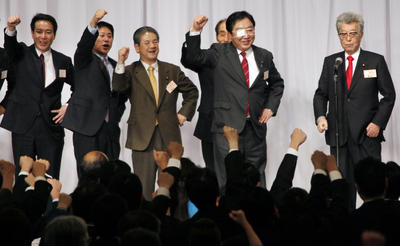But the Prime Minister went beyond the replacement of these two ministers by adding three new faces to his cabinet — presumably in order to strengthen it in advance of what will be an extremely fractious session of the Diet.
At the heart of the coming battle are bills to raise Japan’s consumption tax from its current level of 5 per cent to 10 per cent by 2015. This move is widely viewed as an economic hammer blow to the Japanese economy and is likely to send retail sales plummeting and worsen Japan’s deflation. It is also seen as pure electoral poison. Each time the consumption tax comes up as an election issue, the ruling party is severely punished at the following election. Rank-and-file members of the ruling Democratic Party of Japan (DPJ) are understandably sceptical of Prime Minister Noda’s conviction that the Japanese public will appreciate the need for an increased consumption tax. Noda sees it as necessary to prepare for the immense social welfare costs associated with the coming massive increase in the number of retirees and the elderly over the next few decades.
In order to provide a spokesman for the government’s tax reform plans and to establish a go-between with the opposition Liberal Democratic Party (LDP), the Prime Minister named Katsuya Okada, a former leader of the DPJ, as his Deputy Prime Minister and state minister for tax reform and government revitalisation. That Okada was named the point man on tax reform, and given the rarely bestowed title of Deputy Prime Minister, makes explicit the Prime Minister’s doubts as to the ability of the current chief cabinet secretary, Osamu Fujimura, to defend the Noda government’s plans. But Okada is already ruffling feathers by announcing, without prior consultation with the DPJ leadership, a plan to reduce legislators’ stipends by 8 per cent to make the proposed rise in the consumption tax more palatable.
In addition to causing confusion as to who is the real spokesman for the government, the Okada appointment is also failing to provide a bridge to the opposition. One of the supposed advantages to having Okada as a part of the government is his ability to call upon a pre-existing working relationship with LDP Secretary-General Nobuteru Ishihara and New Komeito Secretary-General, Yoshihisa Inoue. But Ishihara and New Komeito’s leader, Natsuo Yamaguchi, are refusing to accept the idea of a rapprochement on a point of protocol: that as a member of the cabinet rather than the DPJ secretary-general, Okada is no longer the proper interlocutor for Ishihara and Inoue. It is a petty, artificial barrier to communication between the ruling party and the main opposition parties on the tax issue. But as the opposition holds a majority of seats in the House of Councillors and can stymie the passage of any legislation save the national budget, the LDP and the New Komeito leaderships feel comfortable in rebuffing government overtures, no matter who the messenger may be.
The other appointments in the cabinet reshuffle are not nearly so portentous as the Okada appointment. Naoki Tanaka replaced Yasuo Ichikawa as Minister of Defence, with the appointment being solely attributed to his seniority in the House of Councillors. But Tanaka has already stumbled in his comments about the contentious plan to construct a replacement facility for the US Marines Corps Air Station Futenma. Tanaka’s statement that his ministry will definitely move forward on constructing a replacement facility at Henoko in northern Okinawa — a plan the Okinawan people and prefectural government oppose — comes just as portions of the US suddenly seem to be wavering in their support for the rebasing plan.
Meanwhile, Jin Matsubara was appointed Chairman of the National Public Safety Commission and state minister for dealing with the 1970s North Korean abduction issues, and Hirofumi Hirano was appointed Minister of Education, Culture, Sports, Science and Technology.
The reshuffled cabinet has no members in it closely associated with Ichiro Ozawa, the DPJ’s former leader and a major power broker. This is an ominous state of affairs given Ozawa’s considerable pull among a significant fraction of the DPJ Diet membership. Loyalists to Ozawa and Yukio Hatoyama — a former DPJ prime minister — nearly joined hands with the opposition in a no-confidence motion that would have unseated Prime Minister Naoto Kan in June of last year. Kan was only able to parry this attack through an unprecedented promise made to Hatoyama to step down from the premiership ‘after a certain interval’.
With an uncertain standing within his own party, a stonewalling opposition and an economic program featuring painful and controversial tax increases, Prime Minister Noda faces a very severe test of his power and popularity in the upcoming Diet session. A passing glance at his recent cabinet reshuffle does not inspire confidence that the Prime Minister will be able to pass this test.
Michael Cucek is a Research Associate at the MIT Centre for International Studies and the author of the Shisaku blog on Japanese politics and society.


Great piece, as always.
DPJ missed a real opportunity late last fall to divide the opposition by tempting Komeito via a favorable proportional representation allocation offer in the course of the on-going reform of the Diet electoral system.
Now with Lower House, Upper House and Tokyo Metropolitan Assembly elections appearing on the near political calendar, a unified LDP-Komeito approach that seeks to bring the Noda government down this summer, capture the Lower House this fall, and then aim to ride the tailwind into Upper House and Tokyo Metropolitan elections early next year appears to be the political play at hand.
Noda/Okada’s tax raising zeal is both poor politics and policy at this point of the (political and business) cycle.
Sourabh